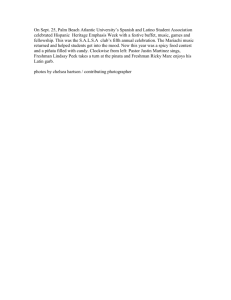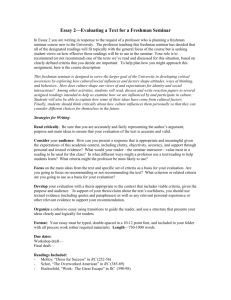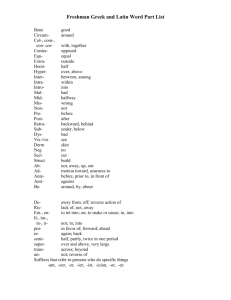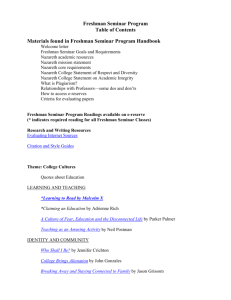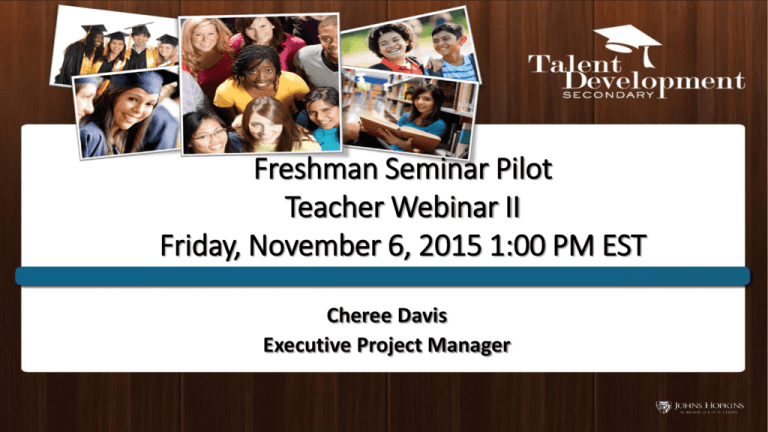
Freshman Seminar Pilot
Teacher Webinar II
Friday, November 6, 2015 1:00 PM EST
Cheree Davis
Executive Project Manager
Goals
1. To provide support and guidance to
classroom teachers who are piloting
Freshman Seminar learning modules.
2. To answer any questions classroom
teachers may have about how to use the
pilot lessons, resources, and student
materials.
What is Freshman Seminar?
• Freshman Seminar is a first-semester ninth-grade course.
Which is taught using in-depth lessons that are implemented
using innovative and traditional teaching techniques including
long-range projects, cooperative learning and reflective journal
writing.
• Students learn social and academic readiness skills that can
enable them to be successful in their core content courses as
well as their social life.
Freshman Seminar
Freshman Seminar
• Improved reading skills
• Technology skills
• Better math skills
• Organizational skills
• Study skills
• Research skills
• Note-taking skills
• Conflict and anger
management skills
• Time management skills
5
Why are we doing this?
•
•
To close cognitive and
non-cognitive skills gaps
of students who live and
learn in poverty.
Ultimately to design
student success
curriculum that will
enable schools to meet
the diverse learning
needs of students.
GOOD NEWS
http://www.tdsschools.org/freshman-seminar-module-prototype-2015/
- Since 1999
FRESHMAN SEMINAR WEBINAR
Thank you for agreeing to
pilot some of the new
learning modularized
lessons for Freshman
Seminar!
This is good news and
your feedback and input is
valuable to our curriculum
development team!
Today we will review the
new teacher and student
materials with you and
hopefully provide you with
key information about how
to use our learning modules
to keep your students
engaged and connected!
Few things to keep in
mind during our webinar
today:
1. These are pilot lessons
in draft form.
2. These materials are
only for your use!
Let’s get started!
Our Goal
About it…
Recent research suggests that noncognitive skills which are the
strategies, attitudes, and behaviors
youth use inside and outside of the
classroom are critical to young
people’s success in school and the
workplace.
~Public Profit
info@publicprofit.net.
The Non-Cog 9
1.
Mindset
Intelligence and skills can be built and I can learn from my mistakes.
2.
Mindfulness
Directing attention skillfully develops well-being and focus.
3.
Resiliency
Productive Persistence: Tenacity + good strategies
The Non-Cog 9
4.
Cultural Competence
Disrupting stereotypes and myths of race, poverty, and cultural
knowledge.
5.
Social Interactions – Relationship Management
Conflict Resolution, Self-Advocacy, Relationship Skills, Emotional
Regulation
6.
Brain Science
Cognitive processes that impact goal-directed behaviors and
higher order thinking in both learning and social interactions.
The Non-Cog 9
7.
Purpose / Goal Setting
Helping kids find, define, and align to purpose and goals.
8.
Scarcity
When things we need are in short supply: money, time, attention.
9.
Shame and Trauma
How shame and physical and emotional trauma impact selfesteem, academic self-confidence, and achievement motivation.
National Standards
1. College Career Readiness-CCR
2. American School Counselor Association-ASCA Mindsets and
Behaviors
3. International Society of Technology in Education-ISTE
4. 21st Century Learning Skills
5. Universally Designed Learning Standards-UDL
Freshman Seminar Module Topics
1.
2.
3.
4.
5.
6.
7.
8.
9.
Note-taking/Mind Mapping
Active Listening
Stress Management
Dealing with Authority
Approaches to Conflict
Turning Failure into Success
Life After Graduation
Using the Internet for Research
Study Skills
What will you be
piloting?
What type of technology will you need?
• MS PowerPoint
• LCD Projector
• Internet Access
• Adobe Pro
• Maybe speakers
• Maybe a Smartboard
• Maybe cellphone text messaging
• Ability to access YouTube videos, etc.
Technology Integration Features
• Each lesson can be displayed using MSPowerPoint
• Adobe enables us to create electronic handout students can complete,
save and email if they are working away from the classroom.
• Remind 101 is a live link in some lessons, because we want to encourage
teachers to use features like this to send reminders to students and
families.
• TDS Teacher Web Page will have a blog feature for teachers to share tips
and ideas with each other regarding the modules.
• Student Weebly Web Page.
• Survey Monkey feedback (anonymous)
• Smart Board compatible when teachers have MS PowerPoint on show.
Key Questions
1. Do you have internet access?
2. Do you have the ability to stream
video and MS PowerPoint?
3. Are you able to assign online work
to your students?
4. Do you have an LCD projector?
5. Do you have the ability to play
videos with sound?
6. Will you be using any text
messaging apps or features with
your students?
Prototype-a first, typical or preliminary model of something, from which
other forms are developed or copied. www.dictionary.com
The prototypes we share today,
is not our final product for
Freshman Seminar, we are
experimenting with how to
create a new and improved
product!
Accessing the lessons/modules
http://www.tdschools.org/freshman-seminar-module-prototype-2015/
Password: FS2015
(ALL CAPS, no spaces)
TDS Teacher Web Page
• Read everything on the welcome page! Live links to resources and
materials are embedded throughout the page.
• Step 1: Resources you will need to teach a module
• Step 2: Explains how to access modules, how to display them during
teaching, and how to access student materials.
Each module can be edited by the classroom teacher after they have
downloaded it. Encourage your teachers to download the modules they plan
to teacher. This will allow flexibility with planning and lesson additions, if
necessary.
Lesson Overview Page
Making all the Connections
NTSE
• Research and information fluency
• Technology operations and concepts
If you are using Success Highways and/or
College Summit materials in conjunction
with Freshman Seminar, then…
21ST Century Learning
Success
Highways
Teach this FS lesson after. . .
U6:D7
And before you teach. . .
U6:D8
• Information Literacy
College Career Readiness Standard
• Research to Build and Present Knowledge
Before You Teach
Step 1.
Student can download their materials at:
http://mmgstudent.weebly.com/fs-u6.html
— OR —
Step 2.
If you are not using the website materials,
click the “Student Printable” icon to print
the student activity sheets for
all three module.
You have the option to print the each module with teacher’s notes.
Begin Module 1
Module 1
Module 2
Module 3
© Copyright, 2015. Johns Hopkins University. All Rights Reserved.
Student Printables
http://www.tdschools.org/freshman-seminarmodule-prototype-2015/
Password: FS2015
(ALL CAPS, no spaces)
ACCESSING THE LESSONS/MODULES
What happens after I pilot?
Survey Feedback Please!
https://www.surveymonkey.com/
r/tdsmmgfs2015
Six Planning Tips
1. Start with the lesson overview pages.
2. Then download the modules with the notes.
3. Read through notes on each slide. They contain essential questions and
directions for both the teacher and the students.
4. Pay close attention to what materials might be needed and decide before
the module is taught if you will require students to do work online using
Adobe Acrobat Reader or if you will print materials.
5. Key terms are intended to be used by the teacher, you may want to
decide how to teach the terms that are not already explicitly being
taught in the lesson.
6. Always double check your technology needs, links, videos, etc.
Teacher Commitment
Pilot the lessons/modules.
Provide feedback via Survey
Monkey to the developers.
Work with support staff
associated with the program or
pilot.
Periodically solicit feedback from
students and support staff who
assist with the implementation of
lessons/modules.
Additional Pilot Information
• Pilot phase will conclude Friday, January 29, 2016, we hope all
lessons have been piloted and surveys are completed by this
date.
• We would like to acknowledge every teacher by name for your
contribution to this pilot. Please make sure we have the name
of your school along with your first and last name. Let us know
if you do not wish to have your name printed in our thank you!
• Please complete the Participation Agreement and have your
principal sign off on it ASAP!
Questions/Feedback
If you have any questions…
Cheree Davis
Executive Project Manager
Email: Cdavis@jhu.edu
Phone: 410-516-8825

